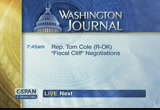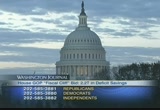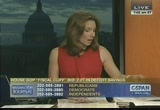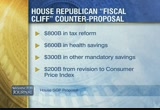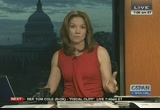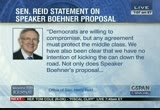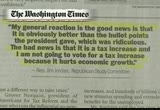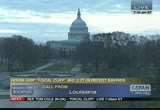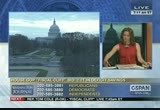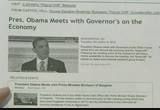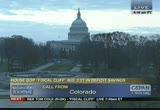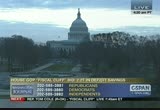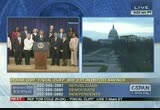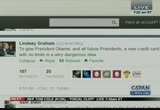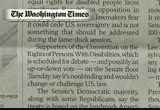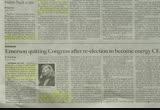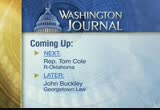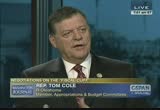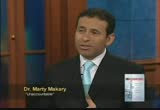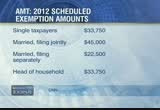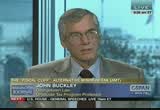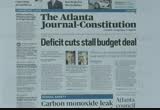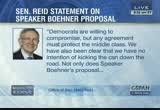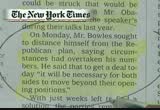tv Washington Journal CSPAN December 4, 2012 7:00am-10:00am EST
7:00 am
fiscal cliff. our guest is republican representative tom cole of oklahoma, a member of the appropriations and budget committee. also joined by georgetown university tax law professor john buckley on how the alternative minimum tax is affecting fiscal negotiations. "washington journal" is next. ♪ ♪ host: 25 days to go before the united states faces the fiscal cliff, the white house has rejected a proposal from house republicans to prevent tax hikes and spending cuts at the end of the year. no formal talks between the two sides are scheduled today. will go outside the nation's capital to get your voice involved. republicans -- democrats --
7:01 am
independents -- send us a tweet, post your comments on facebook, or send us an e-mail. we begin with some of the papers across the country today and how this latest proposal from house republicans is playing out in the papers. courtesy of "the atlantic journal-constitution" -- here is "the denver post" -- finally, here is "of the arizona republic" -- here is "the washington post" on what is inside this deal --
7:03 am
ted in new york, a democratic caller. what do you think? caller: good morning. i do not think it goes far enough. i think it was greenspan that i heard last week said in a discussion panel that a recession as a result of going over the fiscal slope would be a small price to pay to pay back all the bills, the $16 trillion, that this country owes. so, i don't think -- i would like to see with all the talk that we hear from the republican side about their interest in getting down this that the set and debt, you would think that and across the board cut of 10%
7:04 am
that forces and i believe even that taxes should go up on the 98% and that it would put us in a position to really make a huge dent in the bills that we owe. i know some very wealthy, politically active, savvy people in new york and washington, d.c. i can tell you that the wealthy in this country are fighting tooth and nail applying pressure to the political insiders do not have their taxes raised. it is a part of their in come, it is a part of what they look at it as their entitlement, and they are fighting behind the scenes to fan mail. they are so mad that obama has won and they run the risk of
7:05 am
their taxes going back to 39.6%. host: does president obama's proposals go far enough to pay the bills? caller: no. i do not know why they are chicken about to raise taxes and deal with entitlements. i have never served in the military. i want all the republicans to hear a democrat saying if we had to put the age for medicare to 67 and deal with entitlements by extending ages going out into the future, i am all for it. host: an independent caller, what do you think? hostcaller: you look lovely.
7:06 am
we appreciate it. i started talking about this in july 2011. the gop -- he said they are in violation of their oath of office whenever they refuse to raise the debt ceiling. then when they do it on the floor, they are in violation of u.s. code. by dissenting that argument in public and then recommending the public and the court their views. host: this proposal by republicans does not include any thing to raise the debt ceiling. caller: i know but they are
7:07 am
going to have to do that. also, john boehner -- this proposal has $160 billion less than he offered before the election and also raises the money taken out of medicare and medicaid by $62 billion. how democrats or anybody could except that -- could accept that. the average folks here in america do not want to pay their fair share. they cannot argue the point that everybody has to give a little bit more to help us eliminate some of this debt and keep the country going in a positive direction. host: did you see the reaction from harry reid? caller: [laughter] host: let me read a portion of
7:08 am
that. that is what the democratic leader in the senate had to say about yesterday's counterproposal put out by house republicans. we noted in this letter sent to the white house from the speaker also includes the signatures of paul ryan as well as eric cantor and the rest of his leadership team seems to be on board. here is the chairman of the republican study committee's statement.
7:10 am
there is the side-by-side in the "the washington times" this morning. a democratic caller, what do you think? caller: by listening at what is going on in our country, it should be clear to everyone that not only is our country divided, but it is divided because we have a president that is sitting there -- fox news and these other stations resent that fact. i served 25 years in the military and i have seen what our country has provided to people in other countries without any questions asked. we had these big budgets and
7:11 am
things with wars in iraq and then all the sudden the president of the united states is being disrespected so bad that everyone in the free world is laughing at us. we do not even have a democracy here. host: a viewer on twitter says -- steve in florida, an independent caller. caller: good morning. how are you doing? any other way be anre there will agreement. i watched tom yesterday on c- span2. if any family brand their house all the way the u.s. government ran there's, if we could not print money, we would be in a very bad way.
7:12 am
i just think we need to get this deficit under control. those two wars that we have not paid for need to be paid for. you know, it has to be done. if going off the fiscal cliff means that it will be done, so be it. host: other groups are weighing in on these fiscal cliff talks. here is "the new york times" --
7:13 am
7:14 am
governors are slated to hold a news conference at around 11:30 a.m. eastern time. go to our website for more details. washington insiders tackle fiscal cliff policy solutions. the group will hold a roundtable discussion today on the importance of reform to address the nation's debt and deficit spending this event takes place this morning around 8:30 a.m. eastern time. go to our website for all our coverage of the fiscal cliff talks. we have a web site set up so you can follow along on our special page for these fiscal cliff talks. back to your phone calls. good morning, doris. caller: good morning. the plan that the republicans offered, this is just the
7:15 am
romney-ryan plan that the american voters said no to. other than destroying our earned benefit, i do not call them entitlements because we worked hard and we earned them. there are no specifics. what loopholes will they close? of course, they are going to punish the poor and middle- class. their plan still gives another huge tax cut to the 1%. people need to look at what happened to this country between fdr and nixon. look at what happened with the conservative takeover from nixon until now. host: we are going to have congressman tom cole from oklahoma who last week said in a closed-door meeting that they should agree with president obama and extend the tax cuts for middle-class americans and then fight later on for that tax
7:16 am
cut for the wealthy. we will ask him about this latest proposal, the counterproposal from the house republicans. j.d. on twitter says -- on our republican , richard from colorado springs, colorado. caller: c-span could put on actual science. i think there is a lot of magical thinking on the part of democrats here. first of all, they are assuming if they raise the taxes on this one%, it will not affect the jobs and the companies that they work for. nor would it affect the customers they have. what are the percentages of the
7:17 am
most important job creators around? how did you identify them? they had no clue. i think the other aspect of magical thinking is that in the noise and the signal, nate silver pointed out previously a 12% rise in gdp might ake for a 2% rise in employment. in 2005, we got 3.5 million jobs lost. it is a fantasy to believe that the president's spending is going to make employment rise more. recently, there has been an article by a harvard university law professor who says if you are going to do this thing, it is more important to make all the fiscal cuts them back as greece and spain know, when
7:18 am
people do not trust your debt, weak issue too much debt. if everyone heads to the door like china and other is, our debt is really going to go up. host: should the raising of the debt ceiling be tied to these overall conversations or is that too dangerous? you talk about people shied away from your debt. caller: yes. you are going to have a tipping point that people are blind to. since 1847 with popular delusions and the madness of crowds when you get a contagion in there, you do not know what is going to be. people are going to run for the door. it is just stupid. they should have done the tax cuts first and then see if they
7:19 am
need to raise taxes. the more sound policy is to cut some savings first to even see if we have to raise taxes. host: here is the statement put out by the white house yesterday. it actually promises to lower rates for the wealthy and sticks the middle class with the bell. bill. susan in pennsylvania, a democratic caller. welcome to the conversation. caller: what i am thinking is the bush tax cuts or a huge disaster. why don't we simply ask everyone to pay back what they got in the bush tax cuts? we could give them 10 years to do it.
7:20 am
i think we could eliminate a lot of problems by doing that. host: eric in pensacola, what do you think? caller: good morning. high and a constitutional libertarian so i am standing above this republican and democratic thing. the last caller asked about the money we owe. we earned the money. it is not the government's money and th. i never hear it from the democrats. we are not here for the government's spending. we have a right to earn our own money, to keep what we have come not to pay off the things that we share. most of that other stuff that
7:21 am
happens, we should be going to the states to handle it. right now because of the potential of riots, let's stop the business welfare and then let's stop the personal welfare spending stop making people dependent. host: we will keep this conversation going by let me give you some other headlines. "the los angeles times" this morning -- "the wall street journal" says this about the situation in syria -- it is the front page of "the new york times" this morning, and they say this --
7:22 am
peter baker and bryan gordon write in "the new york times" -- then, also we are doing a segment on syria taking a deeper dive into this issue on sunday here on the "washington journal ." moving on to the situation in israel. five nations some men envoys of israel. also, some other headlines for you. "the baltimore sun" --
7:23 am
next to that, president obama suggests a revamp of the russia nuke deal. in "of the wall street journal" -- a "new york times" headline -- much about the phone call which occurred some months ago remains shrouded in mystery. it highlights the level of his anxiety about the current crop of candidates. we are talking about the proposal by house republicans to avoid the so-called fiscal cliff put out yesterday from the speaker's office with signatures
7:24 am
from the rest of the leadership team. christine, a democratic caller, what do you think about it? you are on the air. caller: i have to agree with a couple of other people that called in. we have had 12 years of tax increases for the very wealthy in this country. theit has done nothing to stimulate jobs. it has done nothing to take our economy into a better shape. it was the bush tax cuts and the wars that drove us into this huge deficit that we have now. not the republicans' entitlements for this country and then we have neglected this country and the people of this country. we could have created jobs 10 times over. you have vets that are going to
7:25 am
be coming back here, and where are the jobs for them? we have focused so much on these wars we got quagmired into, obama has been trying to get us out of them for the last four years. all the republicans have done for the last four years is say no, no, no to any kind of -- and obama has tried to push through bills to cut taxes for job creators, fo. host: for small businesses? caller: yes, for small businesses. host: here is reaction from senator lindsey gramm. he says this --
7:26 am
a republican from new jersey, go ahead. caller: i am calling in reference to this fiscal cliff. at this point, all the seniors are already in trouble. they are not going to get but a little increase. congress will automatically get a raise. theys hould stop that. they don't need the money anymore. they have plenty. obama is going to have his way, and that's it. host: can you hang on the line? let me get your reaction from larry duncan on twitter who says --
7:27 am
what do you think, margaret? caller: i think that is correct. there are a lot of loopholes but they do not want to do this. they are happy because they are getting this extra money. if obama gets -- i don't have a charge card. i am paying off all my debt. we should pay off all large debt. how much are we paying for this debt that we go? that is a waste. why should anyone else do it? congress.s stick with here is "the washington times" --
7:28 am
look for our coverage on c-span2 for the senate floor proceedings. yesterday, a headline in "the washington times" -- president obama sending out this tweet -- then, she took to twitter to respond, saying -- that conversation happened on twitter yesterday between the two of them. also in other news on capitol hill, a republican congresswoman from missouri is quitting congress after her most recent
7:29 am
reelection to come an energy ceo. the district covers all of southeast missouri. 62, at the first woman office in mike in washington,an independent caller, what are your thoughts on this? caller: you know, i have my doubts about a lot of things these days. one thing i wanted to mention is every time we have a situation where there was going to be a government shutdown, they put the fear in everybody and then at the last minute they come up with something, and now they are talking about the fiscal cliff. i guarantee you miraculously at the end of the month they are going to come up with something.
7:30 am
they are going to finally get their act together and decide on what is they have to get done. this happens all the time, year after year. i feel that when they are talking about entitlements -- i am a veteran. when they start talking about that, it makes you feel like you are a charity case if you are getting benefits. there are many people out there i know who could have volunteered to go to iraq but they did not do that. i did. other people with disabilities and people who have paid into social security, i feel this benefits should not be intruded on. as far as other things going on right now, i don't understand why they cannot get things together and they cannot compromise on certain issues.
7:31 am
7:33 am
7:34 am
of hurricane sandy. that hearing will be live on 10:00 a.m. on c-span3 this morning with the fema administrator. back to your phone calls. a democratic caller, good morning to you. caller: yes. good morning. i just have a few things to say. the government could put a freeze on a lot of things. if they puts a freeze on these things, i would give the peopl e time to spend money. also, they are talking about medicare. i don't understand why medicare has to be a big thing. i pay medicare every month.
7:35 am
7:36 am
that is an "the washington post" today about the aarp. here is the politico story. it says here that marco rubio does not want to be the hispanic candidate, and paul ryan does not want to be the austerity guy. both want to run for president. each is trying to change their own image. our cameras will be there covering that dinner. from pennsylvania, a republican
7:37 am
caller, what do you make of this bid put out by house republicans yesterday? caller: i think it is bad because i am a senior and i depend on social security and medicare. host: continue. caller: i think it is not right because i am a senior and there are a lot of other seniors out there who depend on social security and medicare. every time you hear something, it is social security and medicare. the seniors are numbers. we have plenty of us out here. i am a veteran of vietnam. it seems like every time something comes up, the american people have to fight, fight, fight. we are tired of fighting. it is time for the republican party to stop arguing with them
7:38 am
bending the 2% of the republican party is not going to do me no good. what about the 98% of us, and the seniors also? independent, an c analler caller, good morning. caller: good morning. this proposal is so ridiculous. i know people that are on medicaid spending my mother is 78 years old and she gets $16 worth of food stamps the month. that is what most people get for lunch. they start out cutting from the bottom instead of cutting from the top. if you are going to take money from somebody, first start with
7:39 am
congress themselves because they are doing such a poor job. start with them first. if they don't do their jobs, then say, ok, let's start cutting down when you get paid every year. host: let me put some dates out there. december 18 is the last date for any bill to be introduced to congress. january 1, 2013, new tax rates and rolls kick in. january 2, 2013, $110 billion in fiscal cliff spending cuts due to begin. march 27, 2013, funding of the federal government expires. august 1, 2013, white house's suggested deadline for resolving major changes to the tax code
7:40 am
and entitlements. ron has this to say about the fiscal cliff -- let's hear from ray in philadelphia, a republican caller. caller: good morning. i think the republicans have to get out a better message. if we realize we ran out of money for all the programs we are having, what is going to happen in another 10 years? what happens is, these people earning more than $250,000, they worked from the age of 18 to move up the ladder and finally reached success. the pint the republicans have to make is it is time to lower taxes on middle-class families. it has reached a pinnacle. it is time to may be lower taxes
7:41 am
on the middle-class. we have to cut spending because the economy is in such bad positicondition. democrats keep pointing out that 98% of businesses are less than $250,000. 98% of people working in those businesses -- with that went to ink in a mechanic's shop or a car dealer? would want to work in a small grocery or in a big chain may be making more money as a manager? we have to have an economy that is based on people reaching the top. we are inducing people to continue working in small businesses and continuing to rely on the government. it is time to help people reach the top.
7:42 am
then we will be able to work on an economy that is sustainable and can support every single person. host: denise, a democrat in cleveland, go ahead. caller: good morning. the hour you doing? -- how are you doing? i have been watching about the fiscal cliff for the last couple months or so. my problem is they're talking about cutting revenue and entitlements. when it came down to entitlements in the first place, i paid into social security for 30 years. i paid my money. it does not make any sense for you to cut my salary which is almost lower than $16,000 a year. i used to make $38,000.
7:43 am
now down to $16,000 and i have to give up more? i do not think that is right. if they just do one thing, all the congressional people, all of the senate people and the people in washington, d.c., give back $10,000 from themselves. 2%. i think they can come up with almost a billion dollars right there. host: ted, what do you think? caller: good morning. i believe that several of the callers today saying that the government should be run like a household. [indiscernible] they need to be able to do that
7:44 am
to keep the economy going. programs like medicare, why they are paid into by people throughout their lives, they need to have oversight in order to keep them leaner. i work with medicare a lot. they need to be reigned back a little bit. the way that positions are reimbursed, the way that private insurance and medicare -- it needs to be looked at and it needs to be cut back. host: we are going to continue the conversation with congressman tom cole, a member of the budget and appropriations committee who will join us for our discussion on the fiscal cliff negotiations. later on, and a lot of the fiscal cliff discussions have been about the bush tax cuts them back later on, we want to focus on a major deadline coming
7:45 am
up on the alternative minimum tax, or amt, and how might congress fix it. we will be right back. ♪ >> we are at the new york state museum. this is our gallery dedicated to the history of september 11. we decided to tell the story from the first moments of the attack using objects and photographs from the world trade center site. this is a piece of steel from the south tower. we put it in a place where the public can actually touch it.
7:46 am
this is a piece of steel from the north tower. this is a dramatic piece of steel. this is within 10 floors of the impact from the north tower. you can see where the openings where the windows would have been. every piece of steel is marked so you know which building, which floor, and which side of the building it was on. this one we picked because it was so close to the impact and because it has the chalk numbers. 71-74. >> this weekend, we look behind the scenes at the history and
7:47 am
the literary life of new york's capital city, albany. saturday on c-span2 and sunday at 5:00 p.m. on c-span3. >> "washington journal" continues. host: we want to welcome back to our table congressman tom cole, republican of oklahoma. let began with the news. john boehner send a proposal to the white house yesterday. what do you think? guest: it is a great opening start and makes it very tangible what the speaker committed to after the election. which is we are going to put revenue on the table. that is an enormous step forward by the republicans. not something we want to do but something we recognize we have to do to get there. i think the proposal to rex us toward where the real problems
7:48 am
are which is entitlement spending. we cannot solve this with just revenue. while we like the paul ryan budget, the speaker basically picked up elements of some of the proposal from erskine bowles in an effort to try to reach forward. i think the speaker should be given a lot of credit for a great opening position. host: so, loopholes and deductions that. does that violate the pledge to not raise taxes? guest: i don't think so. i think keeping tax rate with a r is the real question. you can increase revenue without increasing tax rates. honestly, just a more efficient system redistributing investments toward things that generate economic growth. that is something that paul ryan
7:49 am
has been a leading advocate of. yeah, i think this is a really smart and good proposal by the speaker, and i was very pleased to see every republican sign off on it. it was not just his name. i hope the white house understands there is unity at the republican leadership table. host: here is a copy of the letter sent to the white house with the signatures of the leadership team including paul ryan. a lot of our callers have talked about the lack of details in this proposal then back which loopholes or deductions do you get rid of? guest: there is an interesting debate and discussion on that. that is for the negotiators. the easiest way to do it would be to cap the dollar amount and let the individual pick and choose which deductions they wanted to use. the administration has talked
7:50 am
favorably about this. look at a percent of a person's income that you could use towards deductions as well. either of those things sounds easier than going to line item by line item. there are some obvious candidates i think, but they are going to have their cast of defenders as well. host: were you given a copy of this proposal? guest: no. i saw it the same time everybody else did. host: the rank-and-file of the republican caucus has not see it. guest: they have by now but they were not consulted or brought in. you cannot negotiate with 240 people in the room and then i think the proposal put out is very consistent with what most republicans believe. host: jim jordan had this reaction.
7:51 am
he has a lot of conservative republicans. does speaker john boehner have the votes for his proposal? guest: i think the real question will be does the president have the votes? democrats are screaming about i cannot be part of it. so, the mere fact we are discussing those things is good. in terms of vote, if there is going to be a deal, there will have to be votes from both sides. these two guys have dealt with one another before. we act as though none of them are ever able to come to a deal then they they came to a big deal without shutting down
7:52 am
the government in april 2011. they came to another one on the debt ceiling deal as well. so, you know, they need to take it to another level because this is a bigger and more complex problem and it is the beginning of serious negotiations i hope between the two. the president won the election but the republicans won the house and not likely to lose it in the next election. hopefully this is the beginning of a really productive relationship. host: you made some news last week when you said that republicans should agree with the president, go ahead and extend the tax cuts for 98% of americans and fight later on for extending tax cuts for wealthier americans. guest: i still think that is the
7:53 am
smart thing to do. more important, it is the right thing to do it. we do not want to raise taxes on 98% of the american people. we should take them out of the line of fire so to speak. we want them to be engaged in the debate. if they are worried their taxes are going to go up, they do not have a lot of confidence any way, i think that is what they are going to focus on. takesition would be let's it off the table then bent that complement both of these proposals. it is not in contradiction. it is still the sensible way forward. >host: how many of your republican colleagues agree with you? guest: i have no idea. this whole idea came out before thanksgiving originally when we
7:54 am
were having a deputy whip meeting. the chief whip solicited everyone's opinion. i offered i thought this was the way forward. you guys are pretty smart about figuring out what goes on in this town then they all the sudden it becomes a sensation. i think it is a tactical question. i think it is the right thing to do. host: have you spoken to speaker john boehner -- guest: i speak to him all the time. we have a wonderful relationship. he has been very fair to me. he is always open, honest, and direct. what you see is what you get. that is actually true. he gives other people the same privilege. you are allowed to say what you think. i still think this is the right
7:55 am
way to go. host: because you have not changed your mind, there was a tweet put out by a reporter which says tom cole will not sign the petition. guest: absolutely not. you do not signed the discharge petition. there would not be enough signatures anyway. i did not see any democrats signing any discharge petitions. that is not the right way to do it, but actually think the idea makes a lot of sense. it does not violate any buddies situation. hopefully at some point, the two sides will come together. let's start on something we agree with. host: some might hear you and say it sounds like you're putting your politicparty and yr
7:56 am
politics ahead. guest: our chief negotiator is the speaker and then he has come to agreement before. i recognize that. my advice was offered in private and was leaked in public. i can thank the person who did that for all the press, but it does not change my responsibilities. you can also discredit your idea by undercutting it. i think right now the discussion and the ideas are good. i am not going to allow anybody on the other side to destroy my own credibility with my own team. that is not going to work very well. host: let's get our viewers involved in the conversation. peter, go ahead. caller: hi, congressman. you are still saying the same
7:57 am
things you said at the town hall meeting. you know that ryan budget plan, i have read it. it is all about eliminating social programs. here is my fear. it really has not been honest with the people. i think that fiscal cliff is just a big red herring. your district has the shortest life span in the country for women. the infant mortalithighest infay rate in the country. we follow mississippi. i think that is where you are leading the country.
7:58 am
if the people of the united states want to see where you and the republican party -- come and look at your district. guest: i would be delighted to have people come and look at my district and then it is 14,000 farms and ranches with two military installations. 5 colleges and universities. 11 indian tribes. the best college football team in america. it is a very special place. i would argue with your statistics. i just won reelection with 68% of the vote. having said all that, the idea that the paul ryan budget is about getting rid of social programs is ntot so. it is about saving them. these programs are going bankrupt. all are going to have to be
7:59 am
reformed. if the president gets every tax increase he is asking for, let's just assume that he did, it would not come close to solving the budgetary problem that we have, particularly if he wants to protect 98% of the american people from a tax increase. i think you have to work through these things and the republicans had a lot of courage about putting the paul ryan budget on the table. we need to same that -- we need to see the same kind of courage from the democrats in terms of entitlement spending. the speaker has done something a lot of republicans would say before the election they were not willing to do. he tried to do that during the grand bargain effort in the summer of 2011. i think we're trying to recognize power is divided and we're trying to come to the best deal for the american people.
8:00 am
you are going to have to solve the budget problem with reforms. host: that is the first line from this proposal put out by the speaker's office. cindy on twitter says -- how you get that done in two weeks if that is the proposal? guest: it is amazing how fast this place can move when there is an agreement amongst the major partners. we are not coming to this discussion with no proceeding discussions. there have been a couple of there have been many months, a couple of years of negotiations. a lot of the scoring, pieces are known. it is a matter of putting together a plan that enhances the prosperity of the american people and draws political support. that is tricky, and something
8:01 am
for the president and the speaker to work out. while they are doing it, i would argue let's protect the american people and lead negotiators argue where they differ, and not worry where they are on the same time. host: north carolina. republican caller. caller: this question of the rich paying their fair share, they say 53% of americans voted for that. i saw president obama on television about one month or so before the election saying he was not concerned about the deficit. i have a question. do all of the people on medicaid, that obama put on
8:02 am
medicaid, does it come out of the medicaid program? guest: yes, it does. that is why i like paul ryan plan, which limits inflation growth. we find the states do better with exactly what we did on welfare in the 1990's. the great thing about paul's proposal is that it is not new. it has worked before. what is new that -- is that he had the political courage to put it in a package. host: con twitter, alabama, chris -- the gop plan is to create fiscal crisis that can privatize social security and medicare. guest: that is not true. our aim is to expand those programs for future generations.
8:03 am
right now, everybody paying in is paying more than their parents and grandparents, and if we do not make changes they will get considerably less. let's sit down and deal with these things. if it is a math problem. we're not talking about getting rid of the program. we are talking about strengthening them. host: he talked about middle class americans and extending the tax cuts for them. "the new york times local editorial says this -- -- new york times" editorial says this -- guest:
8:04 am
with all due respect to the new york times, it is now surprising that they are critical of republicans. having said that, this is a good faith effort. the 67 this is something the president has raised before. let's clarify reality. host: you are talking about raising the medicare eligibility age? guest: it is in context with what we have out there. we have done that with social security. we give people a lot of time. it would not affect anyone on the program, anybody close. we changed the social security system when i was in my 30's. it is not a surprise that i will get a check -- that i will not get a check at 65, like my
8:05 am
father did. these should be done in a bipartisan way, over a long time, in ways to protect people. there is a lot of room, but the end of the day hit you do not make changes, they will go broke and you will not protect them by raising taxes on the top 2% host: raising of a village -- 2%. host: raising eligibility is all you have to do? guest: no, i think the plan on medicare part d has worked well. it lets you bargain, but should get a better rate and a better set of benefits, but puts the individual in control of their own health care, to some degree. there is a variety of things. the president has put out $300 billion plus of medicare cuts
8:06 am
and reforms. it does suggest that he recognizes there needs to be changes in these programs. people that say absolutely no change in medicare, medicaid and social security -- i think the negotiators have agreed on medicare. host: robert, independent caller. virginia. caller: i do not hear people talking about raising revenue dealing with the oil companies. one of the things killing the economy is higher fuel prices, but the prices -- the profits for the oil companies are so big, you have to say how come they can not take less so the rest of the country can get on its feet? guest: i will disagree with you. the production is a very
8:07 am
expensive item, and their profits are 5%-to-8% and what they invest. microsoft and intel pay a lesser percentage of taxes on their revenue. people focus on gasoline prices. look at your heating bill. the natural gas boom has brought down the price. it is about one-quarter of what it was three years ago. that is a good deal for the american people, a wonderful thing bringing industry back. it is generating more jobs, income and opportunity than almost every other sector and is not as profitable as high tech. host: coral springs. democratic caller. caller: good morning. i think the bush tax cuts
8:08 am
should expire. has anyone tried to calculate the amount of money that the economy lost when the tax cuts were put in place? it is only to% of the rich, but you cannot continue to pay the same deals with less money. also, bringing the soldiers home, we are paying money to contractors and this other stuff -- that would also bring down the deficit. you congressman, i do not know how much you are making, you have to vote against your check. guest: you covered a lot of ground. congress has not had a. in five years, has not deserve one. -- pay raise in five years and has not deserve one. if you ask people to make
8:09 am
sacrifices, you have to make them your self. i think speaker john boehner has done that. we have not seen that in the senate. in terms of saving money on defense, you are right, and we are. the two sides agreed to over $500 billion in defense cuts. people say is this funny money, is it real? it is not something i am in favor of because we live in a dangerous world we will lose 75,000 soldiers. we wanted to have 213 combat vessels. we will have 288. this is real reduction. i think the secretary of defense, secretary leon panetta has -- will tell you we have gone as far as we can safely go.
8:10 am
i think both sides, and the president, i do not think we want military capability lower. i think we have saved as much as we possibly can. in terms of the other things, after the bush tax cuts came to thousand three, and revenue is higher than it was in 2003, and generated a lot of growth, and the deficit with the last republican majority leaving office -- our problem is a spending problem. we're spending a lot more money than we were then when the president came into office. we're putting off dealing with entitlement programs. we will double the people on medicare in the next 20 years. we should focus on where the problems are, and it is not the revenue side, but the spending
8:11 am
and entitlement side. host: joseph in maryland this agrees on twitter. if we restore, it will be where it needs to be in 10 years. guest: i would disagree. a family of four, that is a $2,000 tax increase for them. the president has said he does not want to do that. our side does not want to do that. going back to the clinton tax rates, remember, the average american family has taken a hit. median income four years ago was $54,000 a year. it is about $50,000 a year now. this portion of the population has been squeezed. adding taxes on 90% will not be
8:12 am
helpful. how much do you want folks to bear? freezing those tax rates for the overwhelming majority of americans is a smart thing to do. host: you said fight later on. guest: the fight would start the next day. we could do what i'm talking about, and negotiations could continue. doing what i'm talking about does not violate what either side is fighting over. they both say this is something we want to do. why not make sure we do not have some last-minute failure at the end of december. guest: what gives you confidence that democrats would agree later on? guest: this is where i disagree with some of my colleagues. they seem to think the american people are leveraged, and this
8:13 am
is the democrats leverage. our leverage is in the spending and entitlement issues. the president and his negotiators are smart and able people. they know the revenue they are talking about will not this -- fix the long-term fiscal solvency. the president campaigned on in a hundred billion dollar increase which has morphed into $1.6 trillion the speaker has already put that $800 billion on the table. we could argue over how to do it. i think our way is superior. at the end of the month, the rates expire. holding fast does not keep the taxes from going up, it just gets them to go on everybody. it will take a proactive measure
8:14 am
on the part of the parties and the president to get something done. this would be a big piece that would take a lot of worry off of the minds of the american people. host: what are the odds we go over the fiscal cliff? guest: i am an optimist, i do not think we will, but when we wait until the last minute, something could go wrong. we got right to the last minute on what could've been made government shut down in april, 2011. the last minute on the fiscal cliff -- i do not think it is a good way to do business. it seems to be the way we are doing business in this town. host: if we were to go over, what happens? guest: probably, congress would be back in session quickly and we would do something but i am talking about right now, hopefully, and continue to negotiate. it is not to question of dollars and cents. some people have said we could let the rates go up and the republicans could take something
8:15 am
down and they could call that a tax cut. people would lose faith in the institution and political leadership. trust is a funny commodity. you have it until you do not. you do not get it back if you lose the trust and then do the right thing the next day. we should convince the country, the markets and the world that america can make smart decisions and tough compromises. this would be a step in the right direction of showing we can work together, and we could put the people first. we have differences and we could fight without putting them in harm's way. host: roger altman writes in "the financial times" -- "why the fiscal cliff will be averted."
8:16 am
guest: there is something to what he says. there is nothing like a 1000 point drop in the stock market, and whether you think you are using it, or not, you are. jobs are tied up. people have investments without realizing it. i would agree with what he has to say, oh why do we have to wait? we are about one or two big deals away from reigniting economic growth in this country. i do not care what side of the political divide you are on, we are all better off when the economy is growing. if we could make a good deal, a smart deal that calls for compromise on each side, i think we could help the economy by showing the political system from cit at host: gerald rights -- how about getting rid of subsidies for farmers, corporations and big oil? guest: if you look to the
8:17 am
republican farm bill, it gets rid of direct payments for farmers and it asks for reforms on the other side. food stamp use is up 47% or 40% in the middle of what is supposed to be a recovery -- 48% in what is supposed to be a recovery. there are things to be had on both sides of this. in terms of subsidies, it is not like oil companies get a check. they get the same deduction that manufacturers do. it is called the intangible drilling and depletion allowance. you do not get those bricks overseas. encouraging production here, which creates jobs and energy independence is a smart thing. i suspect those things are on the table when you get into discussions about loopholes and
8:18 am
whatever, but the big deductions and loopholes and deductions and charitable giving, and how you deal with these will be an interesting debate. host: john, hampton, georgian -- georgia. independent caller. are you with us? james, ky. republican caller. caller: i would like to know why politicians do not go off and say what is going on. all of these people are on disability, and they are smoking a cigarette, and then you find out that the guys will not work. they have to get mexicans, and the government pays their house.
8:19 am
it is about time the government gets out of the business of supporting kids. host: congressman? guest: you covered a lot of territory. i'm a conservative republican. i think the government should do as little as possible, but having said that there are cases where people need help, particularly children, who note which it through no fault of their own are in difficulty -- who through no fault of their own are in difficult situations, we need to take care of them. i'm not saying everything needs to be rooted out and taken away, but when you are running trillion dollar deficit, you have to make hard decisions. we cannot get there on revenue alone, so in time reform has to be a component. host: massachusetts. susan. democratic caller. caller: thank you for taking my
8:20 am
call. one of the most important concerns is one of the details in the paul ryan budget that i've learned about one month ago on npr and that is and $800 billion cut and medicaid over 10 years, and i understand that two thirds of the money spent on medicaid are the -- are on the elderly in nursing homes and the disabled. it seems like a draconian approach if we were to take that kind of money out of that population. what is there a problem, that they got old, they became disabled? " we are in this position because life -- we are in this position because life expectancy has increased. guest: this is a case where washington language gets in the way of looking at things
8:21 am
rationally. there's nothing in the paul ryan budget that calls for cuts. it's just as we are not willing to increase. remember, the president in his opening discussion, talked about three to $50 billion worth of cuts. they are -- $350 billion worth of cuts. they are not really cuts. it is a decrease in growth. it is not as if we are not going to continue to spend money. on the paul ryan budget, the medicaid portion, simply block grants to the states, and increases the amount every month because of inflation and population growth. he is not about cutting things, but moving the growth rate to something sustainable. these programs will be bankrupt in a decade we do not do something.
8:22 am
you can not willy-nilly raise taxes to cover it. there is not enough money. host: from twitter -- capital gains could be taxed the same as income from work, including text for social security and medicare. gee, i disagree, because you want people to -- guest: i disagree, because you want people to invest, and with capital gains, you do not know if you will win or lose money. you need to keep people investing. what the appropriate rate is, there is a matter of a good discussion worth having, but as a rule, the lower the rate, the better for investment, the better for job growth. in terms of medicare and medicaid, you will see for upper-income under obama-care, that has been done. if you make over $250,000, if you will pay a tax. -- you will pay a tax to fund
8:23 am
that thing. the democrats and an enormously new program that has $600 billion of taxes over a decade that are beginning to kick in. if you go to a tanning salon, if you buy a wheelchair, there will be taxes, and if you are a high- income investor, you will already hit with taxes. host: are those of included and budget proposals? guest: we think some of these things should be open for negotiation, but we lost the election, so the president will not do a full repeal. having said that, there are areas we have worked on before, trying to get rid of 1099 forms, and democrats said that was a dumb idea, and the president signed that repeal. we will continue to work, but this thing is a backer fiscally
8:24 am
for the country or the next decade and that will become progressively more evident. host: linda. your honor with representative tom cole. -- you are on with representative tom cole. caller: i do not understand how you do a budget. we have done budgets, and medicare and social security would equate to my mortgage and health care. i do not understand why you start at the top, which will hurt the most people, and then blackmailed them. you are talking about seniors, people that paid in their whole life. this is always what you go to to cut. i and stand it is a big chunk of payment, but if you cut -- i am understanding is a big chunk of payment, but if you cut 10%, does that not make up for a lot of it? maybe congress and the senate should be paid by what they do
8:25 am
instead of the street salary and benefits, because if you were paid piece works, you would have almost no salary. guest: i like the idea of being paid for what you do. if the senate has not produced a budget in three years, so they have not had the courage to do it. less sierra senator harry reid produces one next year -- let's see if senator harry reid produces one next year. you might not like the republican budget, but they have had the courage to put one out and vote on it. to your point on why do we start and social carry and medicare, i would argue we do not. it is the last place politicians want to go, not the first place. we've done cuts in other areas. we've done over five wanted billion dollars in defense. some people -- $500 billion in
8:26 am
defense. some people think that is great, but we will have fewer soldiers, fewer planes. some savings have been bringing troops home, but the others are real cuts. the army is something you do not want to pay for, but when you need it, you can not produce it overnight. the drivers of the dead are health-care -- not social security -- of the debt our health care -- not social security so much. we should send out a framework where negotiations could begin because the program will go broke. people drop out of the programs more than they put in. the average couple will spend $119,000 and draw out $340,000.
8:27 am
that population is exploding as baby boomers retire. host: on the defense cuts to come under sequestration, does the gop proposal address that? guest: yes, it does. sequestration is not a good deal, this is something both sides think it is not a smart way to cut. is just -- sides think. it is not a smart way to cut. it is just across the board. it is heavy-handed and it is on top of half of $1 trillion in defense cuts and we have already made and you will lose another 100,000 people in your army that is already dropping. you cannot sustain defense. nothing is more expensive than war. war in the middle east triples the price of oil over night is
8:28 am
important to discourage an attack -- overnight. a strong america is important to discourage an attack and encourage stability. you can not get there with these cuts without effecting other matters. you're not talking about anyone on these programs right now, but you are doing what tip o'neill and ronald reagan did in 1983, changing the nature of social security gradually, so people will not feel it, and we will make it solvent. we were much closer to social security going broke in 1983 that we are today. host: fall river, massachusetts. rose. independent caller. caller: good morning. i have a comment.
8:29 am
high pay into medicare. -- ip into medicare. you talk about no cuts, but how come in 2011 i lost my eye benefit and hearing aid benefit? i am paying $93 a month for medicare. i pay 15% of my prescription costs. now it is $11, 43 -- $11.43. guest: we have cut congressional budgets, and that is inappropriate thing to do, and i'm sure we will look -- and that is an appropriate thing to do, and i'm sure we will look at that again. if you look to the total budget in these programs, they do not
8:30 am
go down, they go up. we are not spending less. part of that is we are beginning the baby boomers moving into this. nobody has a reform proposal that would threaten any benefits this lady is currently receiving. nobody wants to do that. if we do not do these things, these programs go broke and her benefits will be effected. we are trying to reach a sustainable way to protect these programs. host: the gop proposal does include $200 billion come out which could effect social security benefits? guest: it could, but not immediately, and for upper- income people. this program has been around for years, not hitting people at the lower and middle-income level, but, look, warren buffett does
8:31 am
not need the exact same adjustment in social security that someone that is literally living on social security making $20,000. these adjustments will hit higher-income people. most proposals from republicans have called for the wealthy to pay more for medicare. host: to you think that idea survive politically? guest: i think it does because we did it in medicare part d. democrats see the fairness. people who can pay more should pay more. most of the loophole discussions we are talking about -- people that have deductions have money, pay taxes, and are usually at the upper-end. republicans have been willing to go after that constituency. in some way, democrat resistance on entitlements spending goes
8:32 am
after this. host: we are looking at different policy areas of the fiscal cliff talks, today talking about the alternative minimum tax. help us set that up. guest: it was passed in the 1960's, with the aim of a small group of high-income individuals that were not paying taxes. it did not have inflation adjustment, some of the group has grown tremendously. the only -- the lady is right, the way we budget is arcane, this will come in and a certain way. it will not come in. i would hope in the next year we could have a permanent fix to the amt to get it out of the
8:33 am
mess, the same thing with the sgr, sustainable growth rate. we catch these things over. let's get it out of the budget process so that the numbers can be something we understand and project forward realistically. host: is this a big deal? guest: if we were not to get it done, we would raise the taxes on millions of americans over night, and they would not even know it is coming. it is over our head, and if we do not fix it, you run the risk of the major tax increase and people that makes $75,000 -- we're not talking about the super rich, but pretty average people. host: you heard it from the congressman, over people's heads, they do not know it is coming. hopefully we answer those questions. representative tom cole, thank
8:34 am
you. coming up, the alternative minimum tax, a news update first. >> eric holder will be traveling tomorrow in brussels, in the hopes of building unsuccess of cross border police operations that have dismantled international pedophile networks. they will announce bill launching of a global alliance. iran is claiming to have captured a u.s. drone after it entered airspace over the persian gulf, showing an image of a downed craft and television, but the u.s. navy says all aircraft were accounted for. reuters is reporting that new jersey governor chris christie in a letter to the federal emergency management
8:35 am
administration is asking for a reimbursement of 100% of the costs of hurricane sandy. fema generally reimburses states for 75% of repair costs. at 10:00 a.m. eastern time, the house transportation committee will need to hear testimony from fema administrator craig fugate. those are the latest headlines on c-span radio. >> we have had these explosions of knowledge in madison, but we have not coordinated care, and all of these services and adding so many cracks that they are as harmful as the diseases that we are treating. you have to step back and ask, are we hurting people overall? on a global level, what are we doing sometimes?
8:36 am
now, we have these reports saying that 30% of everything we do might not be necessary in health care? 30% of the medications, the procedures? this is something that i think is really being called out as a problem. this function in the u.s. health-care industry, dr. marty makary on what health care companies will not tell you. his new book, "unaccountable." "washington journal" continues. host: as part of the fiscal cliff that is looming, we look at different aspects, today, the alternative minimum tax, which will impact 30 million americans if congress does nothing. we are joined by georgetown
8:37 am
law's john buckley. what is the alternative minimum tax. -- tax? guest: is requires it to pay the greater of what you pay under regular income tax, or what you would compute under the minimum tax, which has a slightly more broad base, this allowing some of the reductions in a regular tax. in some respects, it is very similar to the patch on itemized deductions that is being discussed. rather than directly attack preferences and expenditures, it puts an overall cap on the benefit. there is no new idea in this debate. the cap there's a strong relationship to how the alternative minimum tax works. host: here is a form from the irs in 2011 tax preparation, and this is part one, the
8:38 am
alternative minimum tax income. how do you know if you fall into the amt? how you know? guest: i believe you can only with computer programming. if we did not have computerized preparation of tax returns, i think the amt would be repealed a long time ago. if people had to go through that form with all of the details, there would have been a revolt against the complexity, much less the tax. it is burdensome if you try to do with it without tax return preparation software. host: give us the history of the amt. guest: in its current form, it was enacted in 1986, and it had
8:39 am
been the goal to have a robust minimum tax, and the desire grew out of not being able to reduce tax expenditures. they saw this as a feasible way of attacking on warranted tax expenditures, similar to the current proposals for the cap. they enacted in 1986, just at the time when their fondest dreams were realized. it was a very serious tax reform that made the alternative minimum tax almost obsolete from the beginning. the only tax benefit denied in the alternative minimum tax after 1986 was what most people would consider to be middle class personal exemptions -- the standard deduction, state and
8:40 am
local income and property taxes -- those are the main deductions disallowed in the amt. after 1986, the amt was no factor. it did not apply to many people. it was not indexed, but it gradually began to apply to more people. the real expansion of the amt came after the 1997 reduction in the capital gains rate. the amt has this bizarre rate structure. it's effective rates are higher than ordinary rates over a broad segment of income. in 1997 the reduce the capital gains rate from 20% -- 28% to 27%, and people rushed to sell off capital-letter assets to take advantage of the reduced
8:41 am
rate, and many found their rate reduction went from 28%, to 27% -- the just switched texas. the capital rate in amt is higher on incomes from $200,000 to $250,000. in 2001, the reduced regular tax rates but did not reduce the amt tax rate. for millions of people, and i'm one of them, the 2001 tax bill only changed the name of the text that i paid. i had little benefit from the rate reduction because i was just shifted over to the minimum tax. . -- minimum tax. in my opinion, it is the result
8:42 am
of a conscious decision in 2001 to hide the cost of the bush tax deductions by leading the amt in -- leaving the amt in place. host: the alternative minimum taxes 20%. after 2001, if your tax rate was lowered to 25% or something, you still have to pay the amt, which is 28%. guest: you hit the 35% rate in the amt at an income of far lower than the income level at which you would hit the 35% rate in the regular tax. host: why do they call it the amt patch? guest: because it is an ad hoc,
8:43 am
one-time, year-by-year tax stop. you could ask why it is called a cliff. they have discussed this in terms of a patch. it is nothing but an increase in the amt exemption to prevent tens of millions of people from being forced to fill out the return that you have there. the only thing that i would add is what makes this so critical in the fiscal cliff discussion is that we are talking about the patch for the 2012 taxable year, unlike the rest of the fiscal cliff which effects rates that will apply next year.
8:44 am
the patch applies for returns we file early next year. if there is no congressional action, there is an abrupt increase in tax on the 2012 taxable year. in 2011, approximately 4 million people paid the amt. if there is not a patch, 30 million people will be required to pay the amt in 2012, and they will pay an additional $90 billion in tax. very few of them have any idea this is on the table. host: is the irs prepared? guest: the irs is fairly unusual, but in a correct position, that congress will do
8:45 am
the responsible thing -- they took the position that congress will do the responsible thing. they assumed congress will enact a package before the end of the year, and i think that was the reasonable thing to do because i believe they will do that. however, it does mean if there is not a patch of the tax return filing season next year will be quite chaotic. host: john buckley is our guest talking about the alternative minimum tax as part of the fiscal cliff negotiations, and as mr. buckley said, this index 2012 taxes, which it is impacts 0.12 tex., so if you have a -- impacts 2012 taxes, so if you have a question, call in.
8:46 am
does the amt date back to before the 1980's? guest: this was a tax reform proposal from the kennedy administration. there had been -- has been a variety of forms of the minimum tax. the current one is basically the 1986 version. host: this is "the washington post" graphic on the alternative minimum tax. right now, it hits about 500 million. it would keep which it reached deep into the middle class. white -- it would reach deep into the middle class. why are high-tax states
8:47 am
factoring in? guest: is a higher exemption, and they call it the blue state problem, because it applies to upper-income people in states with robust income taxes. one of the biggest deductions disallowed in the amt is the deduction for state income taxes. currently, if you have a patch, it is a problem that most often falls between $200,000 and $500,000 of income in states of high income tax. host: new york, california? guest: new york, california, maryland, d.c., but as the previous guest acknowledged, if
8:48 am
you do not enact the patch, a family of four, would begin to face amt at income levels as low as $75,000. it has been described as a blue state problem because of its impact on state tax deduction. without the patch it becomes every state's problem, and additional tax and families with children. host: if you are wondering whether it would impact you, if you go to taxpolciycenter.org, they have a calculator. we will hear from joe austin, texas. republican caller. -- joe, from austin, texas.
8:49 am
republican caller. caller: of the alternative minimum tax, we did not hear about this in the election cycle, and all we heard about was the very rich, but it seems that the alternative minimum tax would effected them and they would have to pay at a higher rate, and this is really the intention, in minimum tax on the very rich. -- a minimum tax on the very rich. the question is is this working, and why was it not discussed in the election cycle? guest: i would argue it is not working, and it would particularly not work if you did not have a patch, but even with a patch, the way the amt works, it would increase taxes. take capital gains. the tax rate in the minimum tax for a variety technical reasons
8:50 am
is 22%, not 15%. once your income goes over $500,000, the amt rate and the capital gains rates drop down to 15%. it is a bizarre effective rate structure where you have the higher rate -- between $20,000- odd but it thousand dollars is wealthy between my -- two hundred thousand dollars and $500,000 is wealthy by my estimation, and those making more would be truly effective. why it is not discussed, i cannot tell you, and it is often
8:51 am
ignored in the discussion over the fiscal cliff also. the fact that it does take effect for the 2012 taxable year, means it is not gradual. host: here is kent on twitter. why has it taken 25 years to fix the inflation adjustment for the amt. eliminate all deductions and have amt for all. guest: it might be cheaper for may regulatory standpoint to repeal the regular tax -- from a regulatory standpoint to repeal the regular tax rate. i think it disallows a personal exemption. the standard deduction is disallowed. also, i believe the deduction for state income tax is a
8:52 am
legitimate deduction in determining your net income. i did not see the deduction for state income tax as being a expenditure. when i pay tax in the district of columbia, that is my cost of earning an income, and it should be deductible in computing by federal income-tax liability. it is not deductible in the amt. host: i am. new hampshire. democratic caller. caller: i'm fascinated to hear about the alternative minimum tax. it kills me every year. i'm a small business owner, and my income fluctuates year-to- ear. i could make $80,000.10 here, $60,000 the next, and the next year maybe $45,000. i was looking at my last return.
8:53 am
i made $60,000 and had and amt -- and amt of $7,000. i did not consider the $1,700. i do not consider -- $1,700. i do not consider this making a lot of money. guest: i do not disagree with you. amt is not designed as a way to compute your federal income tax. it is the combination of a reform that was enacted after the need for the reform passed. it was kind of strange that the amt was enacted in 1986 at a time when they deliberately eliminated the preferences that were an argument for an amt.
8:54 am
the real expansion and the reason you are paying the amt is because of a conscious decision in 2001 to reduce the advertise costs of the bush tax cuts by leading the amt tax rates in place. host: you say cost to the treasury? guest: the amt disallowed the benefit of the bush rate reduction for a large number of people. they knew that in 2001. they conscious we let the -- left the amt in place, because without the amt, the advertise costs of the bush tax cuts would be far greater than what they were estimated to be at the time. host: if you did a permanent fix to the amt, how much revenue
8:55 am
loss would that be to the u.s. government? guest: if you left the current rate structure, you would have two scenarios. if you have the current rate structure in place, you are talking -- i mean, a 1-year package is $90 billion. that leads the -- leaves the amt in place for 4 million people, you are talking well in excess of -- excess of $1 trillion over 10 years. i have to agree with congressman cole. nobody believes that money is going to come in, and i think amtress will adapt an patch and a year-by-year basis. host: we are talking about the
8:56 am
amt as part of the fiscal cliff talks, and right wing on twitter puts it this way -- it was supposed to grab the wealthy folks with tax breaks, and not tied to inflation, now it is getting the middle class. steve. caller: i happen to be in the minority that thinks it is a good thing because it raises taxes on folks and pays for government programs that have to be paid for, but i am intrigued by the statement from mr. buckley that there will be chaos if the amt is permitted to go forward, or if it is not attached in 2012. what chaos will happen? people will have to pay more taxes. it is not as if people are sitting around tax software anticipating what taxes are going to be. people will be hit with a tax bill that will be calculated,
8:57 am
and quite frankly, in a more simplified form been standard tax law. host: professor bob kelly? guest: when i say chaos i am -- professor buckley? >> when i say chaos, i am referring to two things. the irs has done programming based on their being a patch enacted by the end of the year. most tax returns software has made the same calculated gamble. i agree that the government needs revenue. i do not think there is any question of that. if you just say that the amt is a good tax because it raises revenue, i do not argue on the notion that we need money,
8:58 am
however is an extraordinarily arbitrary way of raising revenue. it raises revenue not from the super wealthy. the amt applies to few people making more than half of $1 million. it is counter-intuitive. if you are going to raise revenue, it should be as president obama has suggested, shared sacrifice, and that sacrifice has to come from people making more than half of $1 million. host: how do the very wealthy get out of paying the amt? guest: because of the rate structure. the rate between $200,000 and $500,000 are at least as high, and if not higher. your capital gain an income tax
8:59 am
are subject to a 22% effective tax rate. if you're making more than $1 million, they're subject to a 15% rate. you have this weird double break. it raises a lot of money, but in a fairly arbitrary fashion. host: philip. michigan. democratic caller. caller: thank you. this is not so much a tax question. i used to work for a food company in 1972 that was very large, employing 3000 or more, closing in 1985. people here have lost their jobs. why does the government not do something to cut their jobs? for instance, do we really need
9:00 am
the cia, the federal marshals here and there? why do they not get the federal bureau to cover everything? host: that is philip's idea. on twitter, a follow-up with the small-business owner we heard from, saying they eliminated business averaging which is hopeful to small businesses with fluctuating income. guest: it guest: under income averaging, if you have a fluctuating in a come -- income, you pay low rates when your income is low, high rates when your income is high. the average maybe higher than if you had constant and come over that time.
9:01 am
income averaging the be the ability to average over years and pay tax at a rate equal to the harvard marginal rates that would apply to your average income. it was an attempt to address the fluctuating income problem. host: mike in maryland, republican. caller: think you were taking my call. i have a part-time job working for a nonprofit company. as far as i'm told, the company does not even know if they have enough money in the budget for next year to keep me on, although they need me. i am also self-employed with my own company and last year i took a $5,000 loss. i was wondering how the next year is likely to effect and
9:02 am
nonprofits and my type of situation. guest: i think the nonprofit sector should be very concerned about the proposals of capping itemized deductions. it sounds neutral that everyone's deductions would be subject to a cap, but the practical effect of it would be borne by the charitable deductions. if you are in the non-profit sector, you should think of the tax on itemized deductions as being equivalent to a repeal of the charitable deduction. it's a fairly simple thought that if i'm an individual, taking my own case, a $35,000 or $40,000 limit on private eyes deductions, i will still hit
9:03 am
the cap and i will not turn down employer-provided health care. you're beginning to hit that cap fairly quickly and you will not have a choice. you have to pay property taxes, state income taxes, so you will take those deductions next. then you get to your home mortgage interest deduction and you do not have a choice. you have to pay that. the charitable deduction essentially comes last in line in this cap. therefore, it would have a tremendous impact on the charitable deductions. i am not an economist, so i cannot tell you what impact it would be on overall charitable giving, but there are a lot of studies that indicate it would be substantial reductions in charitable giving. you have to look at these proposals in the underlying details.
9:04 am
that is why i said originally that these proposals are very similar to the design. the motivation is the same. it was originally enacted to avoid the difficult political decisions involved in a direct attack. it is the exact same motivation that gives rise to these proposals for capping deductions. host: what is allowed to be deducted if you fall under the amt? guest: it's easier to say what is not allowed. you cannot deduct state and local income property or sales taxes. you cannot deduct personal exemptions. it really is a tax on married couples with children. you cannot deduct what is called miscellaneous itemized deductions, which is fairly small. >> office supplies.
9:05 am
>> if you are an employee, there are not many with unreimbursed deductions. all other deductions are allowed, charitable deductions, it is all very small changes. it is really the state and local tax deductions and personal exemptions, the reason they fall under the amt. that is why it is called a blue state problem, because of its impact. however, it also has this bizarre rate structure. the rates are higher than the regular rates for a time and that's the other reason people fall in to it. host: on twitter. kelly in kentucky, independent
9:06 am
caller, you are next. caller: innkeeper taking my call. there is a youtube video out of here we read being asked a question of the income-tax is voluntary and he says yes. he says you do not have to pay income tax because it is a voluntary tax. if it's a voluntary tax and we do not have to pay the income tax, then why are we forced to and why are people put in jail when they do not pay it? guest: i have not seen this youtube video. i assure you that you should not treated as a voluntary tax and you should file your return because it is a tax. a tax, by its nature, it is an involuntary payment to the federal government. running host: 10, indiana, independent caller. -- host: remington, indiana.
9:07 am
caller: my question to you, mr. buckley, is that there have already been so much scrutiny about the tax code and people making over $250,000 per year already being saying they are paying not too little or too much. my question to you is if this tax is already adding on money that we have to pay, can we just manipulate the tax code? guest: when you say it manipulate the tax law, i hope you are not talking about manipulating it because you have to pay what is due. host: finding loopholes and other things. guest: the discussion of loopholes again, is an attempt
9:08 am
to avoid the difficult questions, that would be involved in a tax plan that eliminates the tax expenditures. most of the loopholes were eliminated in 1986 tax laws that eliminated tax shelters for individuals. there are not many special- interest loopholes available to individuals. if you are talking about loopholes for special-interest provisions in the individual income tax, you're looking at home mortgage interest deductions, charitable deductions, deductions for state and local income property taxes and the taxation of employer provided health care. those are the items that will be involved in any individual tax reform that either puts a cap on
9:09 am
those benefits or repeals or eliminates those benefits to finance lower rates. as much as i would like to be able to say that there are many special-interest loopholes out there that we could just eliminate and finance a more robust reform, that is simply not the case. i would argue that it's different in corporate income tax where there are a lot of provisions that could and should be changed and would result in increased revenues or commit a reduction in the corporate rate. you really have to look at these things. there are different constraints whether you're talking about individual tax reform or corporate tax reform. host: we're talking about understanding the alternative
9:10 am
minimum tax. john buckley, let me come at it this way. do you pay the amt? guest: yes. host: why and how? guest: i have children and personal exemptions are not allowed. my children have no grownup, so that is more historic. i live in the district of columbia so why pay a fairly high level of state and local taxes. i do have dividends and capital gain in come that is subject to a 22% rate in the amt is 15% rate in the regular tax. altogether, you pay the amt. host: how did you first figure that out? guest: in 1997, when congress reduced the capital gains rate, i, and others, went out to sell
9:11 am
assets to take advantage from the reduction of the rate and never in my wildest imagination did i think -- i was a government employee with four children, never did i think a government sally would put you in the -- salary would put you in the amt. i was wrong. i received a polite letter from the irs telling me that i had underpaid my alternative minimum tax. i convinced them that they were wrong. is the only time i went through that forman concluded that they were correct and then i sent them a check for the difference. -- i went through the form and concluded they were correct.
9:12 am
host: did you pay the difference? guest: you pay the greater of the two. host: john buckley participated in crafting all sorts of tax was inflation. chief tax counsel for the ways and means committee. joint committee on taxation and worked for the house legislative council as well as in congress. stephanie in washington, d.c., independent scholar. caller: there is no fix for these and other things because these fixes are how the two parties raise funds. they appeal to the bases of these and that's how they raise funds. i think the problem are the parties, really. i hope everyone becomes an independent. that's the only way we will solve all problems. my deal is the standard
9:13 am
deduction. instead of having all of these gyrations with the alternative minimum tax, the only deductions you should have is something everyone gets. the only two everyone gets is the standard deduction and the charitable deduction and. the standard deduction of, even in simpson-bowles goes up to 12% for really poor people that earn almost nothing, unless you have children. the standard deduction should really be in an amount equal to twice the poverty level. that would help people most at the lower end trying to get into the middle class. also, tell me, when you talk about the middle class up to $250,000, where are 90% of the people? where is the 90% bracket?
9:14 am
how much do they earn that would include 90% of the people? guest: the median family income in the family is around $50,000. half of the people make less and $50,000. if i were guessing, i would say $100,000, above that, just guessing, i would say above $100,000 would be the top 10%. the current standard deduction -- one of the basic aspects of the 1986 tax reform was increasing the standard deduction. currently it is $12,000. that is essentially the poverty level for a family of four, although it seems extraordinary. i do believe that is close to the poverty level behalf -- level.
9:15 am
your entry into the income taxes and much higher than the poverty level. the standard deduction is inappropriate way of doing a tax reform. host: on airline from democrat from kentucky -- on our line for democrats. caller: thank you for letting me call in. i wanted to ask a question or two. why is it that the richest 2% do not want their taxes to go up? i tell you. the middle class people in the low-income people, these are the ones they make their money off of. if they would go ahead and let them increase taxes, they come out way ahead because they are
9:16 am
the ones that pay and that to they make their money off of. host: john buckley. guest: i could not agree more. i believe the economic impact of increasing taxes on the top 2% has been exaggerated, the negative consequences. i believe the caller is absolutely correct that the economic will be an of wealthy individuals in this economy requires a robust middle-class was demand for the goods and services that corporations produce. that is why it's easy for me to be a democrat. you need to help the middle class. if the other upper-income people to the view that there are
9:17 am
going to have to be sacrifices in order to solve our budget, the question is what group do you mask to make the sacrifice first? that is where i believe president obama is exactly correct. now, i would also say that the upper-income people, their businesses will be better if the sacrifice is first at the upper level and not by taking away social security or medicare benefits that reduced demand in this society for other goods and services. there is an economic argument that i think is beginning to see more of, which is essentially what the caller did. a healthy middle class with consumer demand from a healthy middle-class is what is needed for a healthier economy and therefore it benefits all. host: writing in "the san
9:18 am
9:19 am
going away ignores the fact that they never got a rate cut in the first place because they were paying the higher of the two rates. the margins here are small. even when i paid the amt, my reality is not large. if the rates go up, i just switch. i would switch from the amt to the regular tax. i don't think this is a silver cloud here. what i would say is that those people who already have a cloudy situation in that they never got the bush tax cuts will not be harmed, but most people, this is not a good thing. host: mary, franklin, tenn., you are up next.
9:20 am
caller:. for letting me have the line. i have a question and for mr. buckley. i have a little analogy for him. when you have a tv and do not put it in, doesn't come on at? >guest: i don't believe so. that caller: is what republicans are doing. they have turned it on, but they're not putting it in. host: next caller, diane and. -- diane. caller: you have a caller on previously that ran around business and made between $60,000 de thousand dollars per year and you said it was something they did in the tax code that they actually moved the tax on up to her to give the rich a break.
9:21 am
what it when republicans talk about all of the small business owners, $250,000 hurting them, what is the difference when this woman who said her taxes have gone up? they are lying. it was actually the small business owner under $250,000 that was being hurt and had more taxes dumped on them? guest: i don't know the individual prior collar's tax return. it would be very unusual for a taxpayer with an income in that range to pay the amt. it's not impossible, but it would be unusual. in 2001, they enacted a major rate reduction. they let the rate structure of
9:22 am
the amt remained intact. for people between $200,000- $500,000, people who are potentially subject to this increase in taxes under the obama plan, they did not receive the full benefit of the bush tax cuts. that is just a fact. if your income is over $500,000, you get the full rate reductions. this is a very bizarre rate structure in the amt. congress was quite cognizant of that rate structure when they enacted the 2001 act and decided not to change because it had the impact of making that tax cut look less on affordable than it actually was. host: you talk, independent
9:23 am
caller, good morning. -- utah. caller: i have a question and for mr. buckley that i think is kind of a no-brainer. when i was in business, i am retired now, but whenever any of my expenses went up, taxes included, for taxes levied on one of my suppliers or any think under the expenses column, i would just turn around and increase the cost of whenever i was doing to my customer. it seems to me that whatever the tax increase is the businesses, small, medium, or large, unless the velocity has changed, they're just going to turn around and pass on the extra expenses to their customers, who would be the middle class.
9:24 am
has this occurred to anyone making these plans yet? i will take my answer of the air. guest: there is a large dispute about who bears the burden of the income tax and a fan was people would suggest that the individual income taxes borne by individual taxpayers and they do not have the prerogative of passing it on to their customers. that's true for most of us because we have of wage income and we have to bear the burden of the tax. i'm not serve to that it is passed on to. it may be, in some circumstances, like what your talking about, but based on my experience in congress, the perception is the income taxes borne by the individual taxpayers and not passed on. if it were easily passed on, it would be these lobbying groups
9:25 am
you do not currently see. host: we have a few minutes left here on this conversation on the alternative minimum tax, but if your interested on end of your tax adviser, we will focus on that saturday morning with kiplinger's tax expert and he will be at the table to take all of your questions about taxes for your 2012 income. columbia, south carolina, good morning. caller: how are you this morning? first-time calling. i wanted to know what would be so bad about just letting these taxes expire at the end of the year and sitting down right now is deciding what you're going to do about come january 1st? but in other words, get your groups together and decide what you're going to do now wants the taxes go up.
9:26 am
january, you get together and you solve the problem. how is that going to affect everyone when it comes to taxes? will it be the same or different? do we have to do it early? can we do it in january? guest: there are two pieces to the fiscal cliff in that you have to do amt this year. unless you're really intend people to pay that additional tax, it will be very hard in the middle of the tax filing season to reverse that decision. you are correct, i think, on the second piece of the fiscal cliff. that is that the tax rates will apply next year. you have the whole of next year
9:27 am
during which you could reach a resolution on that issue. the only reason why i think that's an extraordinarily bad idea is i think it would be viewed quite an favorably by the financial markets. you could see a reaction. it is bad tax policy to be legislating in the middle of the tax year on the basic structure of the income tax for that year. host: tampa, fla., independent color. -- caller. caller: when a question for mr. buckley and this may be a little generic, but something where friends and i talk about trying to get a basic understanding. instead of having an income tax, has there ever been any discussion about having a national or federal sales tax? this way everyone, from the rich to the poor, they would all pay
9:28 am
the same amount. i'm not sure the exact amount would have to pay. i'm not an economist, but something i have always thought about and i'm just curious about what mr. buckley's got. guest: there were proposals in the mid 90's from then- republican bill archer to totally repeal the income tax and replace it with a national sales tax. it never went anywhere, for a variety of reasons. the first is the rate of the tax would have to be extraordinarily high, well above 20% the replacement tax rate on a consumption tax basis, so the rate would have to be that high. also, it is extraordinarily regressive, taxes. the individual would be paid a
9:29 am
25% rate and his/her consumption and, just as when someone making it $100,000 per year. it would involve an extraordinarily regressive tax burden. i also think we are an economy that is driven by consumer demand. i cannot think of anything that would be more of a guarantee to put the economy in recession than increasing the price of all goods and services that we purchase by 20%-25%. host: the last word on twitter. john buckley, thank you for your help this morning trying to understand the alternative minimum tax. we appreciate it. coming up next, we will talk about the gop proposal in the
9:30 am
house to the white house on the so-called fiscal cliff talks. they put out a proposal yesterday and sent a letter to the white house. first, a news update from c-span radio. >> corelogic reporting u.s., prices rose in october compared to one year ago, the largest yearly gains in july to house and six. prices rose in all but five states. this adds to signs of a comeback in the housing market. nato's top officials say. alliance foreign ministers are expected to approve turkey's request to bolster its defenses against syria. general rasmussen said earlier, any use of chemical weapons by syria would prompt an immediate international response adding a chemical threat made it urgent for the alliance to send patriot
9:31 am
missiles. were this hour from an israeli spokesperson that they are moving forward with plans for two major settlement projects in east jerusalem even as a senior palestinian official warns his government would pursue war crimes charges if they do not halt construction and. international and your -- anger has snow balled following the announced a recognition of of palestine, as a non-member observer in the general assembly. those are some of the latest headlines on c-span radio. host: welcome back. i want to get your take on the gop proposal put out to address these so-called fiscal cliff. $2.20 savings potentially. here is how it is playing out across the country. in "the atlanta journal
9:32 am
constitution." in "the denver post." it would cut more spending and raise new tax revenue by $800 billion. the white house complain the plan >> details. and the washington law, reacting to the proposals being called a counter-bid from house speaker john boehner to the white house. the letter that he sent to the white house yesterday includes the signature of all of the leadership including majority leader eric cantor and the chairman of the budget committee, paul ryan's. all of them are on board with the idea of this proposal put out by republicans. this was a reaction from house senate majority leader harry reid to what the republicans had to put forth. he said democrats are willing to
9:33 am
compromise that any agreement must bridget must protect the middle class and we have a nuclear we in no intention of kicking the can down the road. not only the speaker boehner proposal delay revenues, it sets up another destructive fight over the debt ceiling first thing next year. republicans have made an offer and now it's time to get serious about forging a balanced approach. inside "the washington times," this graphic explains the proposal. $800 billion in higher tax revenues through closing loopholes and other reforms. "six and a billion in savings from programs such as medicare. many are proposing an incremental age increase. $300 billion in budget savings such as requiring federal workers to increase pension contribution and cuts from defense and non-defense programs. this will lower the cost of living increases for social
9:34 am
security benefits. we heard earlier from one congressman who was our guest saying that this proposal was not floated to the rank-and- file. the chairman of the republican study committee, the conservative wing of the party in the house had this reaction." "my general reaction is that it is obviously better than all at once the president gave, which were ridiculous. the bad news is that it's a tax increase and it will not vote for it because it hurts economic growth. in virginia, republican caller. what do you think? caller: good morning. my question, from the earlier segment, they talked about paying taxes as you purchase items, federal taxes? how come we cannot come up with a card that you pay different
9:35 am
incomes? diffferenerent instead of being a flat tax on purchases that you make. host: will be doing a segment this saturday morning looking at year end tax advice. tried to call back with your question or send us an e-mail. democratic caller in new york, what the make of the house gop. don the fiscal cliff? caller: would like to add something on the matter of taxes. it has been recommended, some years ago by a wall street banker, to have a 1% wealth tax from capital accumulation. someone that house $100,000 would pay $1 and dollars. a flat tax with everyone in. -- would pay $1,000.
9:36 am
the good raise a tremendous amount of money even if the income tax rates went down. and this wondering if anyone would be in favor of such a tax. it would be a flat tax. as far as social security is concerned, i do not hear anything about the amount being raised. i think it is $110 and they could easily raise that and raise money there. -- i think it is $110,000. everyone under the wealth accumulation tax would pay that during their lifetime. i just wanted to throw that out as a possibility. host: and other baubles from the york. -- another bob. caller: and is wondering why the rich cannot pay their fair share. i live in upstate new york.
9:37 am
the toll is at $10 and because i do not have some kind of sticker on my window, i had to pay a $2 port tax, some ayatollahs told the dollars -- $2 poor tx , so my toll is $12 to go to new york. does trump pay $500? we are paying 60 or 70 cents per gallon, at the end of the year, that's a big percentage of our income. are the wealthy pay and the road tax? how about these people with electric cars. will they be paying taxes for the roads or will they drive for free? host: "the new york times" -- on the two offers so far. this is the obama's administration offer.
9:38 am
every day here in "the new york times"of the two proposals a the fiscal cliff continues to dominate washington here today and this week. irandy in alabama, republicans. caller: i think both of the approaches here are ridiculous. we keep talking about reforming the taxes when it is so complicated that an average person cannot even do it. it's really time to stop
9:39 am
reforming the idea of taxes with all these tax ideas. it all it's going to do is drive up inflation. every time we raise taxes, inflation goes up. we really need to go to something like a consumption tax. there's a lot of space out your that do not even haven't come taxes, and their roads are really nice and they do not have been come taxes. they live off other taxes. i think they need to try to fix this whole thing was out just keeping throwing money at it. increasing rates and all of this stuff, it's madness. host: we showed you what senate majority leader harry reid had to say it in reaction to last night proposal from speaker john boehner. house democrats are having a caucus meeting this afternoon and after that, media availability with some of their leadership. visit c-span.org for details on
9:40 am
that and our coverage. speaking of congress, president obama asked that wasserman shultz to stay on as the chairwoman of the democratic national committee. next, what is happening in the senate. facing gop opposition. a u.n. treaty advocating equal rights for disability facing significant opposition. host: tune in to c-span2 3 coverage of the senate. next caller. but the make of this latest back-and-forth? the gop sending of their proposal to the white house yesterday.
9:41 am
this caller: is danny from college park, ga.. host: go ahead. caller: greta, i have never seen a group of people who are so willing to be lied to. republicans like to their people all through the election. the only people who were surprised that the president won are people who watch fox news. just like that, a proposal that john boehner puts out. he's trying to say that it is from the bowles proposal but erskine bowles came out yesterday and said flat out that the proposal the republicans put out does not mimic his. therefore, the republicans are lying again. republicans and the tea party people, they know that they are
9:42 am
lying. it is just that simple. the president put out a proposal. ok. don't criticize the president for the proposal. show us a real proposal. do not ask us to trust you. host: reporting in "the new york times." republicans say their counteroffer is close to the numbers supported last year by erskine bowles. he said last week his numbers offered testimony to a special bipartisan congressional committee on a visit reduction were not so much a plan as a back of the envelopes addressed and to show a deal could be struck somewhere between mr. obama's position in the speaker during their talks last year.
9:43 am
next caller, colorado, independent line. caller: i think's he's been as a great way for people to have their voices heard. i think it is time for the rich people to start being a little more patriotic and give back to the country that has made them so prosperous. if we were to increase taxes like we did in world war ii to help pay these wars of, maybe there be more pressure to get out of this situation and start investing in a run country. jackson host: bill, fla., democratic line. -- host: jacksonville, fla. caller: i just look at the proposal that the gop made.
9:44 am
everything that they made affects the people. it does not seem like it affects them out all. they want to take everything from the people and they don't want nothing that happens to them. host: to happen to them? -- what should happen to them? caller: they need to pay their fair share. republicans took this pledge back in 1986 not to raise taxes on the wealthy, but the middle class has been carrying the country all these years. i think they need to pay their fair share. host: right wing radical on twitter. frederick, md., go ahead.
9:45 am
caller: this idiotic notion that the people are not paying their fair share? all one needs to do is look at the irs reports that says the top 1% of the nation are paying a 38% of the nation's income tax bill. the top 10% of the nation are paying the 70% majority of the nation's income tax bill. it's absurd to indicate that it's not a fair share. it obviously is. what these individuals are really saying is, gee whiz, you cannot ask us to pay more. i don't accept that. have a nice day. host: president obama continues to publicly make his case for his proposal are addressing this fiscal cliff. he is meeting behind closed doors today with several governors from across the country. after that meeting, governors
9:46 am
are having an immediate availability around 11:30 this morning. visit c-span.org to watch live coverage. lori in pennsylvania, republican caller. caller: there are a number of areas that have not been a look that that should be considered by both parties. first, my thoughts are for the president to try to force the hand of congress to make a decision, that is not fair to the public in general. forcing anyone's opinion is not giving as their representation. there are many avenues that they could look out to lower taxes, such as the gas tax. that affects all those. effects industry, how people get to work, feed their families. they could look at lowering some of the gas taxes and raising taxes on incoming products,
9:47 am
specifically from china, i think it is time for us to take a vested interest in getting products and goods made in america. the other countries want to sell them here, increase taxes on their products coming in. that could raise the rates of the product of a shelf, but that is only on imported products which could spur more production of our product in our own country. i think those are very viable options that have not been discussed and they should seriously been looked at. host: the make of the republican proposal in the house to raise the eligibility age of medicare from 65 to 67 in order to find more savings in the federal budget? caller: i do disagree with that statement and that proposal.
9:48 am
i would like to see them looking into the issue of welfare and how much money is being expended on welfare. that is something that is nationwide. that is not just democratic or republican. host: budget experts are saying that makes up less than 1% of the federal budget whereas medicare and social security are the big drivers of the budget. caller: i don't disagree with you, but i just do not agree with that particular part of it. i think they are doing that because the president is, adana, track force member -- again, trying to force them. i don't agree with it. i definitely think that seniors in this country have worked and earned their right to retirement when not have to work longer or lose that benefit.
9:49 am
host: we will keep talking about this this morning, getting your thoughts and comments on the gop fiscal cliff counterproposal. in other news, on the front page of "the washington post" this morning looking at the legacy of barney frank. speaking of lgbt, this headline. the highest court still mulling over whether to hear the case on same-sex marriage. here is a story in economy making headlines in several
9:50 am
9:51 am
stemming from a new intelligence -- syria is warned on chemical weapons. we will look at syria this sunday on "washington journal." donna, in georgia, democratic caller. 10 minutes left. what did you make from the gop proposal to avoid the fiscal cliff? caller: the idea of raising the age for medicare is just insane. these people are going to be more sick. if they do not have insurance, it will end up costing more. it makes no sense to do that. how are they going to get insurance when they are 65 in a regular market? it makes no sense. also, i think president bush during those taxes when he did it come in two wars and lower taxes?
9:52 am
it makes no sense. how does not work? that's my opinion. thank you. host: greg in florida, independent caller. caller: everybody pays social security taxes aren't home. they think the maximum is in the low hundred thousands, but why cannot modify the social security withholding to help shore up so security, medicare, and medicaid? host: means testing for social security? caller: people above the current threshold, those making over $250,000 do not pay on the entire income. host: what are you saying? explain. every caller: 1, regardless of
9:53 am
income, pay the same rate. -- caller: everyone, regardless of income, pay the same. host: next caller. caller: the best idea i can come up with is why can we just not cut the debt spending now and giving it away to other countries to help with their economy and stuff? why can we not just cut the debt and stop big government from getting bigger? i don't understand why there are not other people out there for this. host: does that include curbing medicare spending by increasing the eligibility age from 65 to 67? caller: you can raise the age if
9:54 am
you want, but personally i would think the military and other places are ways to save money. people need to actually see the representatives cut spending out in the government to save social security, for one. host: you think that would take care of the debt? caller: i think so, yes. we spend too much money is wasted. host: reporting the fbi wants a new home. the current home has been plagued with problems including a crumbling facades threatening pedestrians with falling debris.
9:55 am
9:56 am
90% of the foreign aid that we are warming to give away. the other is the flat tax. the people cry of the loudest are the 36 million people who pay no taxes at all. these freeloaders need to shut up and pay their fair share like the rest of us. thank you. host: illinois, republican caller. good morning, jim. your note -- you are on the air. caller: the morning. i would just like to comment on the two proposals. from my perspective, the real problem is that spending -- is spending. president obama's proposal it increases spending, i believe, with $200 billion in new stimulus and really does not touch anything on the spending side of the.
9:57 am
-- of the equation. he does not want to address the deficit. he should be calling for tax rate increases across the board and the elimination of many of the deductions that currently deprive the treasury of quite a bit of revenue. there is a lot of talk about how raising the tax rate for the top tier of newcomers will bring in -- income earners wil bring in like de dollars billion per year. at the same time -- in like $80 billion. the losses from the mortgage rate deduction is on the order of $100 billion per year. i believe president obama really wants to spend more money. spending is so important that he
9:58 am
has to call for shared sacrifice across the board rather than targeting a very small portion of the population and asking them to pay all the bills for the programs that he wants to spend on. host: do you agree with the grover norquist tax pledge to not raise taxes? caller: in service of the tax rates? yes, i do. i am also left scratching my head because i believe when the bush tax cuts were put into effect that many democrats oppose those as being bad for the economy. yet, and now, they are running around saying we cannot let the rates go back to the talks rates that we set up under president clinton -- the tax rates go back.
9:59 am
what let's stick out with came out yesterday from the republicans. they want to bring in new revenue from tax reform, $800 billion being their calculations. do you agree with some who say that is increasing taxes? caller: yes and no. it depends. i would agree with that form of tax revenue increase if it went with spendingd reductions. host: that is where you see compromise? caller: we have been through this before. i have friends that frequently site back in reagan's presidency that president reagan increased taxes, but he did that as a consequence of an agreement with the democratic leadership with the democratic leadership
203 Views
IN COLLECTIONS
CSPAN Television Archive
Television Archive  Television Archive News Search Service
Television Archive News Search Service 
Uploaded by TV Archive on

 Live Music Archive
Live Music Archive Librivox Free Audio
Librivox Free Audio Metropolitan Museum
Metropolitan Museum Cleveland Museum of Art
Cleveland Museum of Art Internet Arcade
Internet Arcade Console Living Room
Console Living Room Open Library
Open Library American Libraries
American Libraries TV News
TV News Understanding 9/11
Understanding 9/11